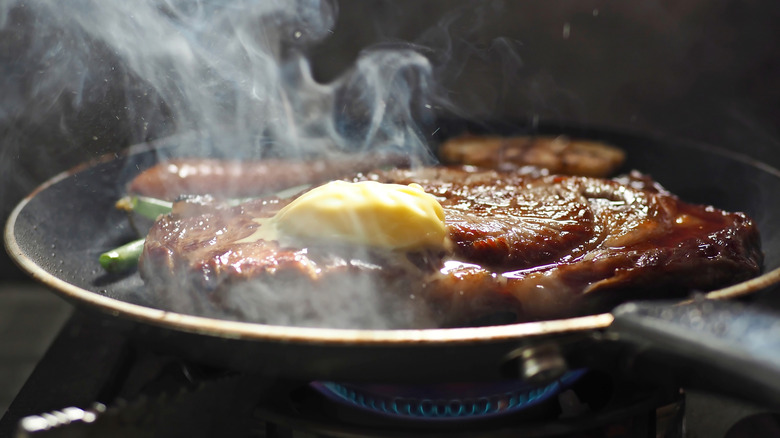Why You Should Never Use Unrefined Oils For Cooking Steak
Carnivores in the kitchen are often spotted engaging in their natural pastime: Pursuing the perfect sear on a steak. Some may opt for the reverse sear and a rare steak, à la José Andres while others may go for the quick sear in a cast iron skillet stovetop, before transferring to the oven to bring their filet up to the desired temperature. Searing, or cooking the exterior of the steak, typically involves the use of some kind of fat, whether it's butter or any of the various types of oil you have on hand. And knowing when to use which kind of oil, of course, is the sign of an experienced cook.
All cooking oils are not created equal. Masterclass explains the ways in which cooking oils differ, along with recommendations for how and when to use a range of oils. For example, some oils impart more flavor than others, which means that flavorful oils like hemp seed oil, walnut oil, and sesame oil will be apparent in your finished dish. Meanwhile, neutral oils like peanut oil, vegetable oil, or canola oil won't change the flavors in your recipe.
Some oils are refined, while others are unrefined. Is there a difference between these oils when it comes to cooking steak? Absolutely. And there's definitely a right choice.
Why shouldn't you use unrefined oils for cooking steak?
Avant Garde Kitchen explains that the best oils for searing steak are avocado oil, grapeseed oil, canola oil, refined olive oil or light olive oil, sunflower oil, and clarified butter. What do all these oils have in common? Well, first of all, they're refined, which means they're processed to remove impurities and volatile compounds, according to Masterclass. The reason refined oils are better for cooking steak is because the removal of these compounds gives the oils a higher smoke point (Avant Garde says this typically indicates 400 degrees Fahrenheit and above), meaning you can sear your steak at a higher temperature.
If you use an unrefined oil and heat it to above its smoke point, that oil will begin to break down, which is bad news for the flavors in your dish (per Masterclass). When oils break down, they impart a burned, bitter flavor that will mar your carefully chosen steak. Getting your cast iron skillet nice and hot and ready to sear your steak means choosing a refined oil with a high smoke point. For reference, non-clarified butter has a smoke point of 302 degrees Fahrenheit and extra virgin olive oil can have a smoke point as low as 325 degrees Fahrenheit. Meanwhile, refined oils like grapeseed (with a smoke point of 390 degrees Fahrenheit), canola (400 degrees Fahrenheit), and clarified butter (450 degrees Fahrenheit) are much better choices as they allow you to use a much hotter pan and achieve the perfect sear.

